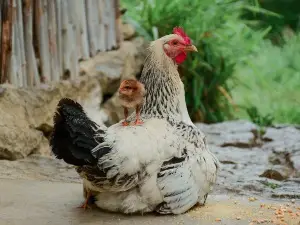
Taking care of chickens is a difficult job, taking care of baby chickens is an even more difficult job because they are so fragile, they can become sick easily, and can die easily as well.
If you’re raising a baby chick and notice that it is lethargic and has closed eyes you’d be right to be worried. This article looks into why this happens.
Lethargic baby chick with closed eyes:
Baby birds may be more fragile than adult birds but a baby chick that is weak, lethargic, and closes its eyes all the time is a bad sign. If your baby bird is acting this way reasons why may be:
A lack of energy:
A lack of energy will make anyone feel a bit groggy and sleepy. If your bird isn’t eating enough or doesn’t have enough calories in its diet then it can start to act lethargic, and close its eyes. This is something that can be dealt with pretty easily.
What to do:
A simple and easy way to get more energy into your bird is to simply offer it some warm sugar water, sugar water will quickly energize the bird.
When making sugar water for your bird, it is advised that you use raw organic sugar because it is less processed and thus retains a lot more of the nutrients, that are naturally found in sugar cane, than other types of sugar.
Give her the water in a dropper if she isn’t drinking on her own.
Anemia:
Anemia is very common in chicks who are between 12 and 28 days old, anemia decreases the blood’s ability to carry oxygen throughout the bird’s body.
This illness can be caused by blood loss, parasitic infections, heavy metal poisoning, or exposure to toxins (through bird toys).
If your bird is not only lethargic but has symptoms such as poor growth, paleness, or depression then the bird may have anemia.
What to do:
The best thing you can do for your bird, if you think that it has anemia, is to get the bird to your local vet to have the baby bird examined.
The vet will be able to find the underlying cause of your bird’s anemia through laboratory testing.
Pasty butt:
Pasty butt is a common ailment that affects chicks. Pasty butt happens when the bird’s feces cake up at the bird’s vent, sticks to the feathers surrounding the area, and causes a blockage in the area.
This blockage keeps new feces from exiting the body. The sick bird’s intestines will eventually become clogged and filled with the bird’s own feces.
If these feces do not exit the bird’s body then they will poison the bird’s body. A chick can die within 24 hours of developing pasty butt if it is not addressed.
Stressful events can cause your baby chick to develop pasty butt. Birds with pasty butt may isolate themselves, close their eyes, become lethargic, and go off somewhere to suffer alone.
What to do:
Have a look at the bird’s vent to see if the bird does indeed have pasty butt. If you see a mass of dried-up feces and feathers at the bird’s vent then your bird likely has pasty butt.
Treat your bird by bathing it in warm water to loosen and remove as much of the feces as you can. Use latex gloves when bathing the bird, doing this is necessary because the baby bird’s feces can contain bacteria that can make you ill.
Pour one inch of warm water into a container and leave the bird in there, make sure that the water covers the bird’s butt, leave the bird in there for one minute.
Some of the feces should loosen after a minute, run the bird’s butt under some warm water to get more feces off of the bird.
Put the bird back in the warm water if the blockage doesn’t fall out. You may have to do this process once or twice.
Dry the bird off with a warm towel afterward and use a hairdryer on your bird to dry it off. Use the slowest and lowest setting on your hairdryer to dry the bird off. Move the dryer around as you dry the bird, don’t keep it in one spot.
Note: Do not bathe the bird’s whole body when trying to remove the blockage. The water on the bird’s body will quickly become cold and the baby bird will become chilled, baby birds can die if chilled.
Avoid pulling the feces out, pulling the feces out may rip the bird’s skin, feathers, and insides out.
If you do this, and the bird starts to bleed, apply pressure on the area for 2 minutes using a warm cloth until the bird stops bleeding. You may have to see the vet if you try to pull the blockage out.
If you enjoyed this article then you may also be interested in other chicken related articles. Here are some articles that you may be interested in: Electrolytes And Probiotics For Chickens, Traumatized Chicken Behavior, How To Help A Sick Chicken Gain Weight, Do Chickens Feel Pain?, Chicken Having Trouble Walking And Standing

